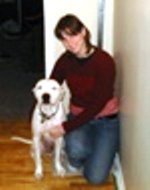Apr 14, 2008 01:40 PM
Raveena Aulakh
Torstar News Service
KITCHENER-"Hello doggie." Those are the last coherent words Ginger Visneskie remembers before her 2-year-old daughter was attacked by a German shepherd last week.
Visneskie had parked her car in the back of her Westwood Drive apartment building at about 11:30 a.m. Tuesday. She, her daughter Lilly and a friend were walking to the Visneskies' ground-floor apartment when they met a neighbour walking his dog, Angus.
The dog had been bitten by a rat the day before, Visneskie said, so she stopped to check his paw.
She was still bent over when Lilly stepped out and said, "Hello doggie."
Neighbours who saw the incident say the dog pounced on the child, threw her on the ground and sunk his teeth into her face. While they looked on in horror, Visneskie pulled on the leash and freed Lilly.
In barely five seconds, the child had been bloodied and appeared to be in shock. Visneskie didn't bother calling an ambulance. She and another neighbour put Lilly in the car and raced to the Grand River Hospital.
For the first few hours, Visneskie feared for Lilly's life and her eyesight.
"He'd bitten so close to the eyes, I thought he'd gouged them out," the 29-year-old single mother said.
When doctors finished sewing up the dozen bite marks on Lilly's nose, near her eyes and just below her chin, she had 35 stitches. She will need extensive dental work, doctors told Visneskie, since her lower jaw had been pushed into the roof of the mouth.
She has started a series of rabies shots — five in total — and may need speech therapy. Four of her front teeth were dislocated.
Angus' owner, meanwhile, says he's shocked by what happened.
"She (Lilly) has patted him in the past and it's been fine," said John Seenstra. "I'm sorry about what happened."
Seenstra said he warned the girl's mother that his dog wasn't muzzled and he said he told Visneskie to pick up the girl as she approached.
"I don't want everyone to think I'm an irresponsible owner," he said.
Along with their intense anxiety about Lilly's injuries, the Visneskie family feels a lot of anger.
Visneskie and her brother Tony are seething over what appears to be business as usual for their next-door neighbour and his dog. Now, when Visneskie sees the owner take the dog for walks, she shakes.
"When I see (the dog), I see him clamping down on Lilly," she said. "I am so scared for her and other children in the building now."
After the attack, the family focused on Lilly's well-being, making sure she got all all the medical attention she needed. Now that Lilly is recovering, the family feels helpless no action can be taken to have the dog removed from the property and to charge the owner.
The Humane Society says it's investigating the incident after some initial miscommunication.
"There are laws that protect people from dangerous dogs," said Kathy Innocente, the society's community relations manager.
"A dog can be deemed dangerous but we need to first find out what exactly happened on Tuesday."
Charges can be laid on the recommendation of the Humane Society.
Seenstra said the dog is normally muzzled when it goes out for a walk. "But I forgot to put the muzzle that day."
That explanation is not good enough for the family.
"Look at my niece. She's stopped talking or smiling," said Tony Visneskie, who is helping look after Lilly. "We don't even know how long she'll be in and out of hospitals."
Visneskie said her landlord, Transglobe Property Management, has assured her the company is looking into options for dealing with the dog.
The Visneskies and other tenants in the building said this was not the first time the dog attacked someone. Last year, neighbour Cayla Woodworth saw the dog bite a woman who had just gotten off a bus.
"It can happen with anyone," said Woodworth, who is now keeping a close watch on her own daughter. "I saw Lilly minutes after the attack, when she was splattered with blood."
Meanwhile, Lilly's ordeal is far from over. She got her first rabies shot Thursday, and some of her stitches ruptured on Saturday, forcing another trip to the hospital.
Yesterday, she spent the morning in bed, hooked up to an IV, with fresh stitches on her face. Later, she was taken to hospital for a second rabies shot. Dental treatment can start once the wounds on her face and neck heal.
"I've been to more doctors in the past week than my entire life," Visneskie said. "It's so frustrating."
She now keeps a sturdy baseball bat within reach.
"I want it to be handy if that dog comes near my baby again," she said.
— The Waterloo Region Record


